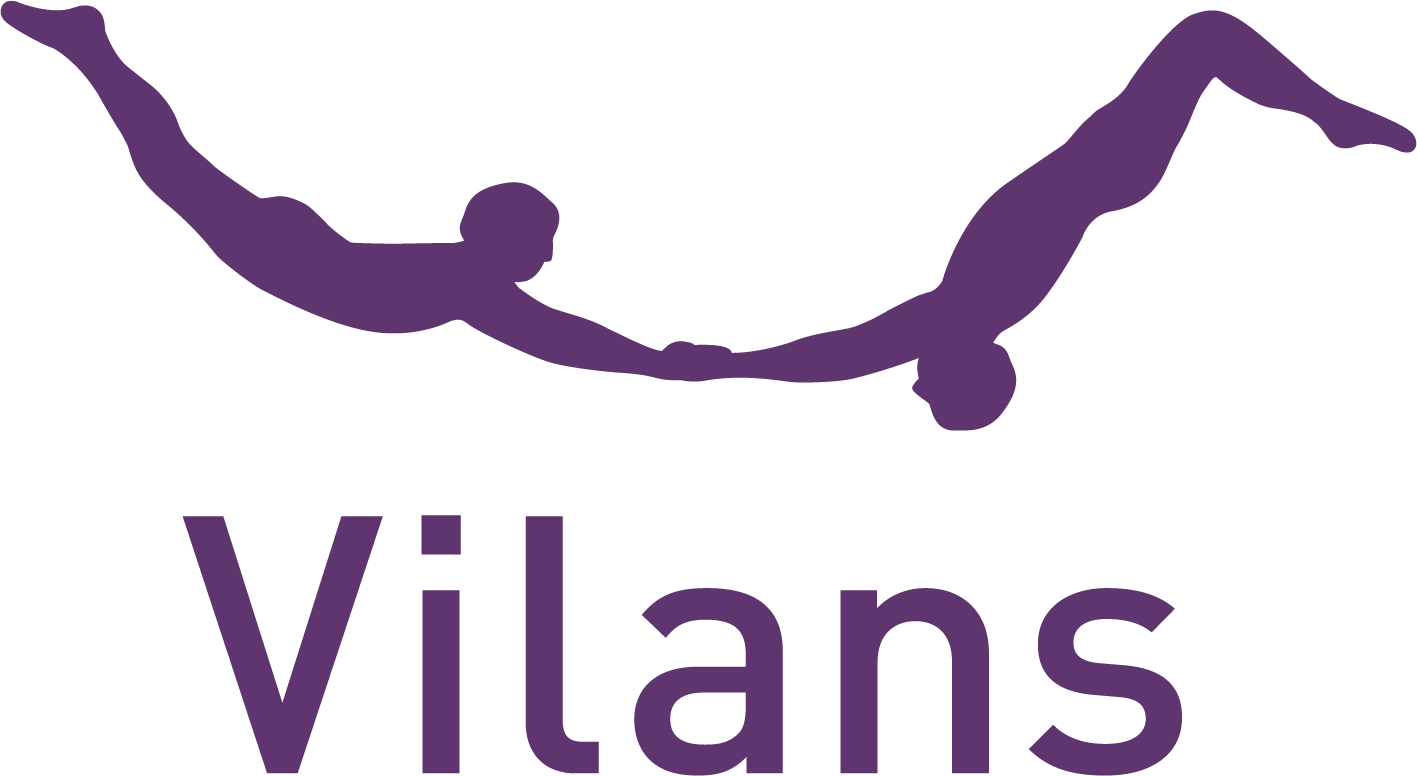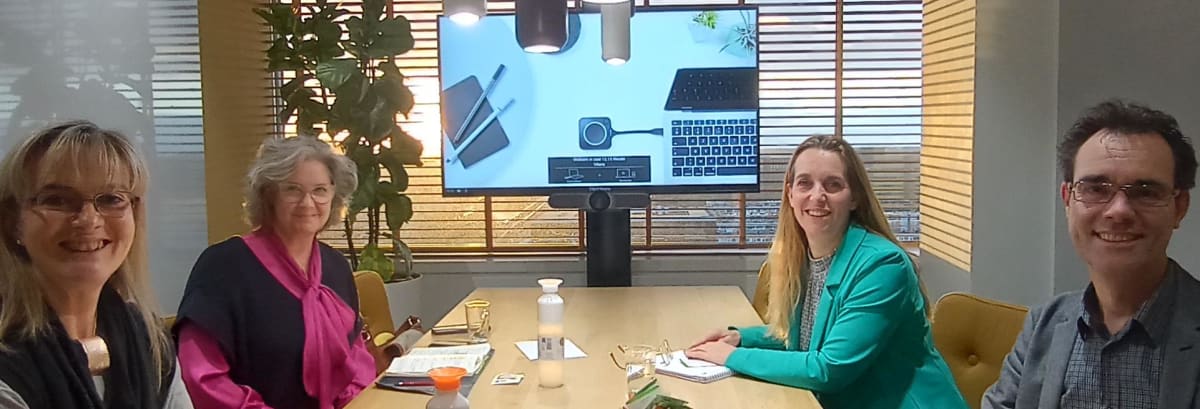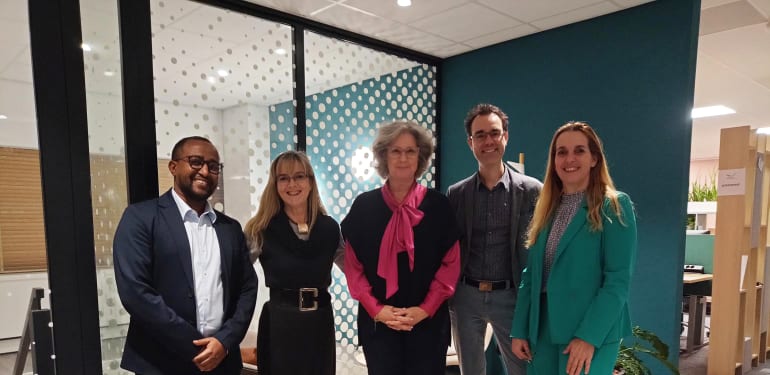Leaders of IFIC Visit Vilans to Explore Potential Collaboration
Published on: 16-12-2024
On December 3, 2024, Vilans welcomed a distinguished delegation from the International Foundation for Integrated Care (IFIC) for a full day of dialogue and exploration of integrated care innovations. The delegation included Dr. Niamh Lennox-Chhugani, IFIC’s CEO, and Prof. Áine Carroll, chair of IFIC’s Board.
The visit focused on two primary objectives:
- To provide the IFIC delegation with an in-depth understanding of Vilans’ role and operations in the Dutch care system.
- To explore opportunities for collaboration between Vilans and IFIC, outlining potential pathways for short-, medium-, and long-term collaborations.
Prof. Mirella Minkman, Chair of the Board at Vilans, led the program and warmly welcomed the IFIC leadership team.
We are delighted to host IFIC’s team and warmly introduce our work and exchange ideas with them. This visit underscores the strength of our collaboration and sets the stage for meaningful joint efforts to address integrated care and domain overarching integrated care challenges.
Prof. dr. Mirella Minkman
A Comprehensive Program
The day featured a dynamic series of presentations and discussions, offering the delegation a panoramic view of Vilans’ contributions to large scale implementation programs, digital online knowledge platforms and innovation. Key sessions included:
- Overview of Vilans and Its Role in Care and Support: Mirella Minkman and Femke de Wit gave a presentation and facilitated an insightful discussion about Vilans as a knowledge institute for care and support. They also elaborated on the programs and projects of Vilans and its pivotal role in the Dutch knowledge infrastructure and care system.
- Dutch Long-Term Care Knowledge Infrastructure: Margreet Reitsma and Mieke van Hamersveld delved into the structural role Vilans plays within the knowledge infrastructure, focusing on the underlying infrastructure we put together to streamline a coordinated, iterative and cyclic knowledge production. The purpose of such infrastructure is to improve access to understandable and applicable knowledge and tools for care professionals in a broad sense and ensure that the care provided is both effective and appropriate.
A joint approach would especially help to make academic knowledge more accessible and transforming academic research into practical and applicable knowledge.
Mieke van Hamersveld
I found the discussions very interesting. It was fascinating to learn that IFIC reaches out to over 70 countries, which is quite different from being a national knowledge organisation like Vilans. And I think there is a lot we can learn from each other.
Dr. Margreet Reitsma (PhD)
- Large-Scale Care Improvement Programs: Discussions centered on Vilans’ role in large scale national care improvement programs and its initiatives to enhance the learning capacity of care systems and drive transitions through technological, social, and organizational innovation.
Our work is about ensuring agility and resilience in the face of future challenges.
Anneke Augustinus
- Integrated Care Initiatives: Nick Zonneveld and Ephrem Tesfay engaged the visitors in a brief discussion about integrated care, spanning from the conceptual foundations to the practical implementation of integrated care models and network initiatives in the Netherlands. They explored shared challenges in measuring the impact of integrated care and addressed the complex nature of collaboration among diverse stakeholders, especially in long term care settings.
The exchange was insightful and productive. We gained valuable perspectives from the IFIC experts on integrated care challenges and strategies.
Ephrem Tesfay
It was fascinating to share ideas and insights with such knowledgeable peers, which broadens our understanding of integrated care and its complexities.
Nick Zonneveld
- Data Monitoring and Knowledge Infrastructure: Bart Boermans gave an overview of how Vilans’ data monitoring works and the value of its data analysis tools, including AI-supported databases. He elaborated on how Vilans integrates its cyclic data collection mechanism and analyses to inform the tools, models, and knowledge products it produces, emphasizing the importance of robust infrastructure in supporting evidence based reliable knowledge production.
- Digital Care Technologies: Prof. dr. Henk Herman Nap and Bob Hofstede gave a compelling and interactive presentation on Vilans' projects in digital care innovations . They engaged in a lively discussion with Dr. Niamh Lennox-Chhugani and Prof. Áine Carroll on the uniform evaluation of different gerontechnologies being deployed in long-term care settings. The conversation also touched on the critical role of technology in addressing workforce shortages and meeting the increasing demand for care, while highlighting the need to strike a balance between technological push and the actual needs of care providers and recipients.
The conversation highlighted the pressing need for standardized evaluations to ensure these technologies deliver real impact while supporting care systems under significant pressure.
Prof. dr. Henk Herman
- Strategic Collaboration Discussions: The visit concluded with an engaging discussion on strategic collaboration, led by Mirella Minkman and Erwin Bleumink. Together with the IFIC delegation, they outlined actionable pathways for joint initiatives, ranging from knowledge exchange programs to collaborating in (inter)national programs in a diversity of care settings and in society, enhancing the movement towards support and care in the home and community setting.
Getting access to and share experience and practical knowledge about care and support in other countries is crucial as a national knowledge institute. Unfortunately, there are not that many national knowledge institutes as Vilans, focused on practical knowledge for care and support. The collaboration in IFIC can help us in setting up knowledge exchange and collaboration internationally. It was inspiring to discuss ways to jointly share and learn across countries with Niamh and Áine.
Erwin Bleumink
A Shared Goal for the Future
The visit underscored the shared goals between Vilans and IFIC in the important role of knowledge in social and technical innovation in society and (health) care. The day’s discussions laid the groundwork for impactful further collaboration aimed at addressing shared challenges while driving innovation and sustainability. With clear pathways outlined, this partnership holds the promise of our organizations aligning their efforts to create a transformative impact on care and support, not only in both countries but also on a global scale.
Today’s conversations were not just about sharing knowledge but about envisioning a future where we work together to improve care systems for all. The alignment of our missions creates a foundation for meaningful and impactful collaboration.
Prof. dr. Mirella Minkman








